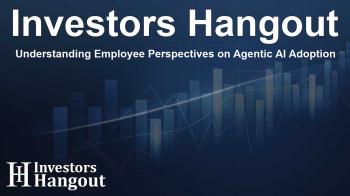Understanding Employee Perspectives on Agentic AI Adoption

Understanding Employee Perspectives on Agentic AI Adoption
In recent research conducted by Pegasystems Inc. (NASDAQ: PEGA), a notable conversation has emerged around the integration of agentic AI into workplace environments. This research dives deep into how employees feel about using AI-powered tools, revealing fascinating insights about acceptance, productivity, and the accompanying concerns that accompany these technologies.
Workers’ Embrace of Agentic AI
As businesses strive for efficiency, the adoption of agentic AI has increased significantly. The study indicates that while 57% of workers are inclined to use AI agents, a substantial 58% are already utilizing these tools in their day-to-day work. This shift suggests a growing comfort with technology that was once seen as complex or even intimidating.
Identifying the Benefits and Challenges
The benefits identified by early adopters are compelling. Many workers recognize that AI agents simplify their tasks—41% of respondents noted that automation of tedious jobs stands out as a primary advantage. Additionally, the survey indicates that reducing time spent looking for job-related information is also a significant benefit, recognized by 36% of participants, while 34% appreciate the swift meeting summarization that AI provides.
Concerns Surrounding AI Integration
Despite these positives, there are clear reservations among workers. When questioned about their concerns, a striking 33% expressed worries regarding the quality of AI-generated work. Additionally, the lack of human intuition and emotional intelligence in AI outputs created distrust for 32% of respondents. Meanwhile, 30% cast doubt on the accuracy of the information provided by these AI agents.
Key Insights on AI Concerns
Further analysis revealed that emotional intelligence, quality, and trust are paramount concerns for employees engaging with agentic AI. About 47% of the surveyed individuals feel that AI lacks the necessary human intuition, while 40% are hesitant to submit work generated by AI. Worries about the comparability of AI-produced work to their own capabilities were echoed by 34% of respondents, reflecting a broader skepticism about AI's reliability.
Positive Predictions for the Future
Encouragingly, 46% of survey respondents predict that agentic AI will have a positive effect on their jobs over the next few years. In contrast, only 13% anticipate negative impacts. This optimism, however, is tempered by uncertainty among others who remain neutral about AI's evolving role in workplaces.
Proposed Improvements to AI Tools
Addressing the highlighted concerns, workers have also provided valuable feedback regarding improvements necessary for wider acceptance of agentic AI. The top suggestion—cited by 42% of participants—is for enhancements in accuracy and reliability of AI outputs. Further improvements called for include better educational resources about using AI tools (39%) and increased transparency in AI decision-making processes (33%). These recommendations set a clear path forward for businesses in their efforts to adopt AI effectively.
Maximizing AI Adoption
The survey results emphasize a crucial point: while acceptance of agentic AI is growing, true mass adoption necessitates that organizations focus on building trust and transparency. AI must be integrated into workflows in ways that amplify human capabilities rather than replace them. This integration creates a holistic environment where AI can help orchestrate tasks, optimally benefiting both employees and organizations.
Thus, educational initiatives aimed at clarifying AI’s role and decision-making processes will be essential in nurturing an environment where employees feel more comfortable with these technologies. As organizations strive to incorporate agentic AI, balancing technology with human insight and ensuring accurate results will be vital for maximizing productivity and embracing this innovative approach.
Frequently Asked Questions
What is agentic AI?
Agentic AI refers to artificial intelligence systems designed to assist individuals with tasks through automation, analysis, and recommendations, aiming to enhance productivity.
Why do workers have concerns about agentic AI?
Workers often worry about the quality, reliability, and emotional understanding of AI-generated outputs, which can lead to hesitance in fully utilizing these systems.
What benefits do workers see in using AI agents?
Many employees find that AI agents automate tedious tasks, reduce time spent on information retrieval, and provide quick summaries of meetings, improving overall work efficiency.
What improvements do employees seek for agentic AI?
Key improvements include enhanced accuracy, better training on AI tools, and increased transparency in how AI makes decisions, helping build trust among users.
How can organizations promote AI adoption among employees?
Organizations can promote AI adoption by ensuring transparency, integrating AI into workflows effectively, and providing education about AI's advantages and limitations.
About Investors Hangout
Investors Hangout is a leading online stock forum for financial discussion and learning, offering a wide range of free tools and resources. It draws in traders of all levels, who exchange market knowledge, investigate trading tactics, and keep an eye on industry developments in real time. Featuring financial articles, stock message boards, quotes, charts, company profiles, and live news updates. Through cooperative learning and a wealth of informational resources, it helps users from novices creating their first portfolios to experts honing their techniques. Join Investors Hangout today: https://investorshangout.com/
Disclaimer: The content of this article is solely for general informational purposes only; it does not represent legal, financial, or investment advice. Investors Hangout does not offer financial advice; the author is not a licensed financial advisor. Consult a qualified advisor before making any financial or investment decisions based on this article. The author's interpretation of publicly available data presented here; as a result, they should not be taken as advice to purchase, sell, or hold any securities mentioned or any other investments. If any of the material offered here is inaccurate, please contact us for corrections.
